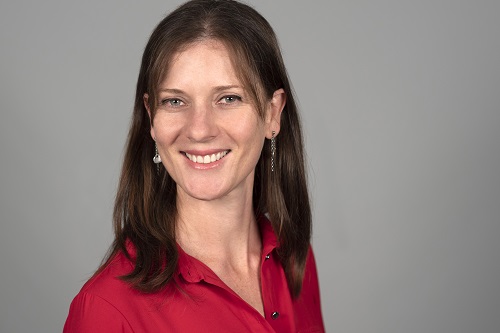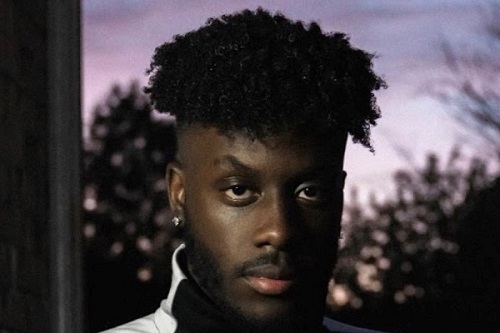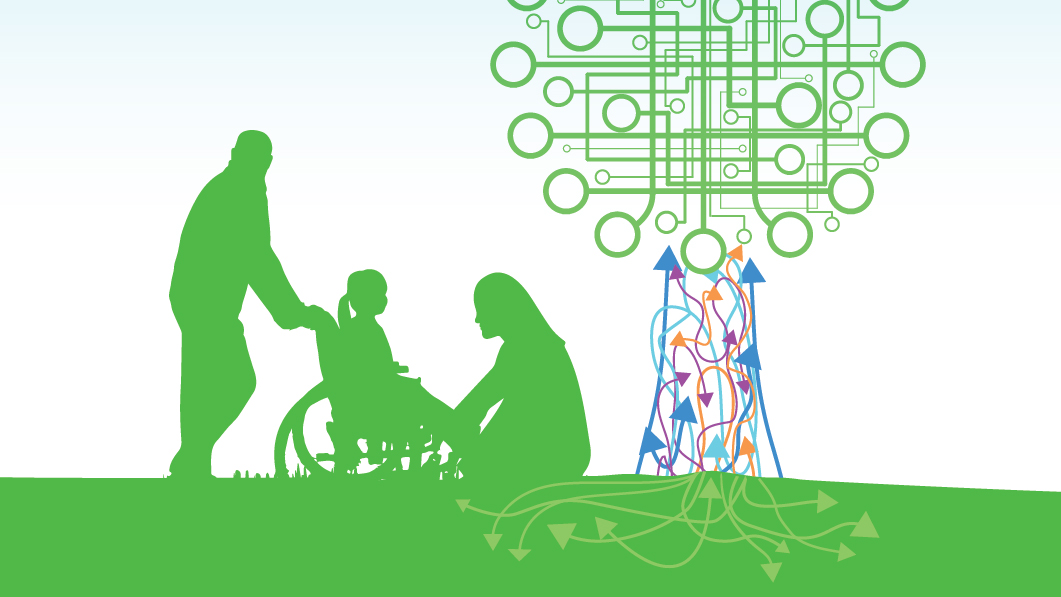Holland Bloorview's research institute's annual symposium is a sought-after event that combines research and the family perspective in highlighting current and upcoming research, and engages health professionals, families, scientists, and government in a united discussion on key areas of focus in childhood disability research. The annual BRI Symposium is Canada’s largest hospital-based paediatric disability health research conference that combines research and the family perspective.
The 15th Annual BRI Symposium
The 15th Annual BRI Symposium theme is Lab 2 Life: Impact of Families on Childhood Disability Research. It took place on Tuesday, November 17.
This year, the symposium shone a bright light on how our clients and families are helping researchers to forge new frontiers in childhood disability research and create personalized, evidence-based interventions.
Held virtually for the first time this year on Whova, a virtual event platform, delegates learned about the novel research co-created by families and researchers as well as trainees to give children and youth living with disabilities a more healthy and meaningful future.
This year’s Mickey Milner scientific keynote was delivered by Dr. Tracey Smythe, an assistant professor with the International Centre for Evidence in Disability at the London School of Hygiene and Tropical Medicine, based in the UK. Her research focus was on the intersection between disability and public health, with an emphasis on the development of innovative interventions for children living with disabilities and their families.
Read the wrap-up story.
The research symposium is grateful to its sponsors, BASF and the Ontario Brain Institute, for sponsoring the event.

What's new for 2020
Learning together: The use of simulation to enhance and enable authentic and meaningful research partnerships
There is a growing body of evidence that involving patients and their families in applied clinical research as patient research partners (PRP) can enhance the relevance, quality, impact and utility of research findings.
However, the literature describes a number of multifaceted and complex challenges that researchers and patient partners face when partnering in the research process. Some of the core challenges described in the literature include: setting clear and realistic expectations for all parties; PRP feeling empowered to provide meaningful input; eliciting meaningful input; and addressing opposing views or opinions.
The underlying themes permeating these challenges are trust, reciprocity and communication. Existing online modules are helpful resources to teach the basic principles of research and the concept of Patient Orientated Research; however, given the complexity of these relational challenges, didactic and/or independent courses are not sufficient to ensure meaningful PRP engagement.
Our team has leveraged a simulation-based, co-design approach to develop a suite of four simulations for research teams and patients to learn how to support each other through some of the most complex and challenging situations associated with patient engagement in research.
Presenters include Kathryn Parker (Senior Director, Academic Affairs and Simulation Lead, Teaching and Learning, Holland Bloorview Kids Rehabilitation Hospital), Michelle Phoenix (Assistant Professor, McMaster University), and Nadia Tanel (Director, Research Growth and Expansion, Bloorview Research Institute, Holland Bloorview Kids Rehabilitation Hospital).
This will be an interactive session and participants will be asked to engage in dialogue and step into a simulation virtually. Active participation is voluntary but encouraged.
Lab to Life: the importance of partnerships in getting research innovations to market
Research institutions strive to make a positive impact through knowledge creation, but how do we transform ideas and knowledge into new processes and technologies that are accessible to families and the healthcare system? What are the challenges and priorities from the perspective of patients/families, scientists, and industry?
This breakout session will introduce audience members to the process of commercialization and technology transfer in the context of an innovative technology developed at Holland Bloorview and taken to market.
Panelists will provide their perspective on how partnerships were leveraged to further develop technology and expand the outreach and impact of the technology on patient and family lives.
The panel will feature a multi-disciplinary group of experts including Azadeh Kushki (Holland Bloorview Senior Scientist), Andrea Palmer (Awake Labs), Christa Studzinski (Ontario Brain Institute), with moderator Sharon Wong (Director, Commercialization, Bloorview Research Institute).
Engaging Families Living with Childhood Disability to Advance More Inclusive Communities
This presentation will consider how engaging children with disabilities and their families about their experiences of everyday spaces and services can be invaluable to the planning and design of more equitable and inclusive communities.
Attention will be given to the families’ experiences of accessing two important childhood spaces: schools and playgrounds. Issues that will be unpacked include families’ inequitable and exclusionary experiences of parking at school, traveling to and from school via accessible school bus services, and using playgrounds without nearby accessible facilities.
Attendees will learn how input from families living with childhood disability can help to unsettle the normalcy of ableist community designs and plans, inform future inquiries into policy and practice, and to produce inclusive communities that acknowledge and embrace the diversity of childhood disability.
This presentation by Timothy Ross (Scientist, Bloorview Research Institute, Holland Bloorview Kids Rehabilitation Hospital, Assistant Professor (Status), Department of Geography and Planning, University of Toronto) will conclude with a discussion about potential next steps for engaging families living with childhood disability in the planning and design of community spaces and services.
Qualitative Research in the Era of COVID-19
In the era of COVID-19, we've all had to adjust to the "new normal" of working and everyday living. For researchers, this new normal looked a little different. The rise of the COVID-19 pandemic meant finding alternative and creative ways to conduct and continue research. The TRAIL Lab quickly adapted to remote work including learning how to conduct virtual qualitative research with research participants.
In this presentation, we will be discussing how our lab made that transition to virtual qualitative research and highlight the pros, cons, and key learnings of remote data collection. Our presentation will also showcase the experiences of a youth and/or family leader who participated in a virtual interview. Lastly, we will discuss our personal recommendations for conducting virtual qualitative research.
Presenters include Abby Vijayakumar, Hiba Ahmed, Kavitha Thiyagarajah, and Vanessa Tomas.
Partnership Showcase
Holland Bloorview enjoys strong collaborative relationships with industry and other external partners, in the effort to advance scientific, commercial and social impact. Come visit our Partnership Showcase to see and experience some examples of successful collaborations, foster new partnerships and explore the potential impact of research here at the Bloorview Research Institute! The Showcase will be held virtually this year from 11:30 a.m. to 12:30 p.m.
Keynote: Mickey Milner International Professorship Lecture

Exploring perspectives: shining a light on stigmatizing health-care practices
Presented by:
Tracey Smythe, BSc Physiotherapy, PMH, PhD
Assistant Professor, International Centre for Evidence in Disability at London School of Hygiene & Tropical Medicine
Bio:
Dr. Tracey Smythe is an Assistant Professor with the International Centre for Evidence in Disability at the London School of Hygiene & Tropical Medicine (LSHTM) and Honorary Physiotherapist at the University College London Hospitals NHS Foundation Trust. Dr. Smythe received her master’s degree in Public Health and PhD in Epidemiology from LSHTM, UK, and completed her bachelor’s degree in Physiotherapy at the University of Queensland, Australia. She is the recipient of Beit Trust Scholarships and the UK National Institute for Health Research (NIHR) Global Health Research Program partnership building award.
Dr. Smythe’s clinical experience includes developing, coordinating and delivering rehabilitation interventions and health-worker training programs in Australia, Brazil, Colombia, countries in sub-Saharan Africa and the UK. Dr. Smythe specialized in paediatric care, and her main work is with children with neurodevelopmental disabilities and their families. Her research interest is in development of replicable interventions to improve the quality of life of carers of children with developmental disabilities, and in the design and analysis of before-after trials, cohort studies and cross sectional studies.
Dr. Smythe’s research enables people to help themselves through empowering interactions in peer groups, and examines the power of diversity and lived experiences that are shaped by socio-cultural, historical, economic and political contexts to optimize inclusion.
Keynote: Lived Experience Address 
Goal to Live Life Unchained
Presented by: Nathan Gaba, outreach facilitator, student and disability advocate
Bio:
My name is Nathan Gaba, I am an undergraduate student at McMaster University, majoring in Sociology and I am also a former Holland Bloorview client, student, research participant, all experiences which have made me a strong advocate for the topic of disability awareness.
Thanks to Holland Bloorview, I have learned some of the most valuable lessons that I have been able to apply in various aspects of my life. One important lesson instilled in me at a young age was the importance of confidence. Through my experiences as an African American living with cerebral palsy, I aspire to be a symbol of perseverance and a reminder that you can achieve all you set your mind to despite any odds you may face.
I've often been told that my gift is my ability to connect with others and lend a helping hand. That's why I have committed myself to try my best to speak on topics that can inspire and benefit others, which brings me great joy. Over the years, I have had many opportunities to use my voice towards many causes, including:
- Teaming up with Toronto police service 52 division in speaking to the use of the various dangers of drug abuse and the immense impact of peer pressure on a person's life;
- Presenting to physical therapists in-training at the University of Toronto about physical health cerebral palsy; and
- Joining the Holland Bloorview outreach team bringing messages of disability awareness and anti-stigma to schools and workplaces across the province.
In addition to public speaking, I enjoy modelling immensely. Growing up, I remember various occasions where I would look at TV or billboards and never saw people with disabilities represented positively. I realized that people often expect individuals with disabilities to lead less fulfilling lives or be shamed before they do. When a friend suggested that I try modelling, I knew it was my opportunity to begin to change the landscape and I was more than happy to try it. I want nothing more than to be a role model to all kinds of people and demonstrate to the world the real power that comes with having confidence and self-love.
As a young African American male with cerebral palsy, there have been various experiences in which these intersectionalities have strongly influenced my life. It has been a great aspiration of mine to speak someday about the topic of disability and intersectionalities. I am thrilled to share this with you at the Bloorview Research Symposium today. My talk on lived experience will address the various ways that disability intersects with race. My discussion's ultimate goal is to highlight different aspects of disability and ethnicity that are often overlooked by the public and work towards ending the spread of stigma within our society.
